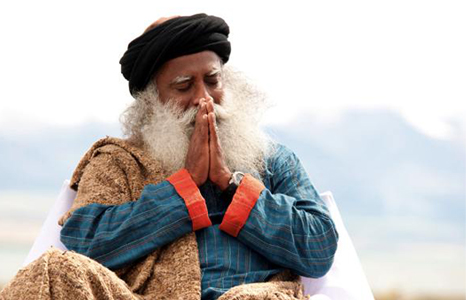What is a Guru?

“If you really want to make use of a Guru’s Presence, you must be willing to allow that Presence to overwhelm you, to overpower you, to destroy you in one way.”
—Sadhguru
Question: Sadhguru, you say we should not simply believe anything, but rather experiment with life and see for ourselves. However, it seems, to grow spiritually, tremendous trust in the Guru is needed. So what is the difference between belief and trust?
Sadhguru: Belief springs from your expectation. When you say “I believe you,” you are expecting that I will act according to your rights and wrongs. Suppose I do something which is not within the field of your rights and wrongs, then the first thing that will happen is, you are going to come to me and say, “I believed you, and now you did this.” If your Guru can be contained within your limitations, then you better not go anywhere near that man because he will be of no help to you. He will solace you, he will comfort you, but this man is bondage. This man is not liberation. Trust is different. Trust is your quality. It is not subject to anything else, it is simply there. When you say “I trust,” it means, “It doesn’t matter what you do, I trust.” That is not falling into the framework of your limitations.
I never asked you to trust me. The very reasons why I never use the word “trust” with people is because it is badly corrupted. If at all anybody here spoke about trust, it is to raise you beyond your own likes and dislikes, your own limitations. The very feeling of “I trust you” raises you beyond this bundle of likes and dislikes. “No matter what you do, I trust you.” If you really want to make use of a Guru’s Presence, you must be willing to allow that Presence to overwhelm you, to overpower you, to destroy you in one way. At least for those few moments that you are with him, you should no longer be yourself. What you consider yourself to be, should be absent in his Presence.
Pulling the walls down
When people spoke about trust, what they meant was that you allow someone else to enter you. If you have to allow someone else to enter you, you have to become vulnerable. Once he enters you, you are subject to anything. The very reason why you have built walls is, somewhere when you made yourself vulnerable, someone did something which was not within your expectations. So you got terrified and built walls around yourself. Now, when you say, “I trust you,” you are willing to pull that wall down, which means that the other person does not have to live within the framework of your expectations. So one aspect is the Presence of the Guru, the quality of who he is, does things to you. Another aspect is, the moment you create that kind of situation that you are not bothered about what is going to happen to you, that itself is transformation.
The time frame that I have with people is limited. So I am making myself available only as a Presence, not as a person. As a person, I am just keeping a certain face – in many ways within the framework of your expectations. If I have to use my person also as a device, then it needs much more trust, and maybe more time. People who are with me for longer periods of time find me an impossible person, which I am not with you.
A conscious concoction
Right now, this personality that you call “myself” is in some ways an accident, depending upon what kind of situations you have been exposed to. Your personality is constantly evolving, beaten around by life. Whichever way life beats you, you will become that kind of shape and form. Your personality is constantly being constructed by external situations. The one whom you call as Guru is not a person. The whole process of self-realization means someone has transcended his personality and then he carefully crafts a personality as it is necessary for the kind of role that he wants to play.
In a limited way, on the surface, you too are building your personality to suit your activity. A being who is experiencing himself beyond limitations does it in a very deep way. He structures every aspect of his life as it is necessary for the role that he has chosen to play. It is a conscious construction. When it is a conscious construction, it is just a device, it is not bondage anymore. Any moment, he can just pull it down. Even now, the way I operate as a person is very different in different places. It may be shocking for you if you see me in other kinds of situations. Because you have fallen into the comfort of knowing this kind of person, when you see another kind of person, you are unable to handle it.
A Guru creates his personality in such a way that people don’t know whether to love it or to hate it. He carefully crafts a personality where one moment you think, “Yeah, I’m really in love with this man.” Next moment, you may feel completely different about him. And both of these emotions are not allowed to cross certain lines. Within those lines, you are constantly being thrashed around so that after some time you will know, this is not a person. This is not a human being. Either he is a devil or he must be Divine.
Taking the jump
That which is not in your experience cannot be taught to you intellectually. To take a person from one dimension of experience to another dimension of experience, you need a device which is of a higher level of intensity and energy. That device is what we call as Guru. The Guru-shishya relationship is on an energy basis. A Guru is touching you in a dimension where no one else can touch you. There are many ways to move your energies to Ajna. But from Ajna to Sahasrar, there is no particular way to do anything. It is just a jump. It is because of this that the Guru-shishya relationship has been held as the most sacred relationship in this culture. If you have to take this jump, you need deep trust – otherwise, it is not possible.


